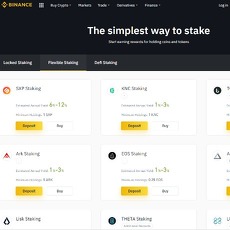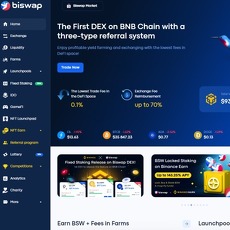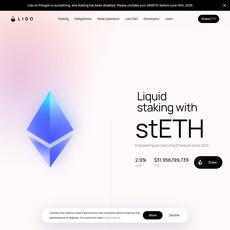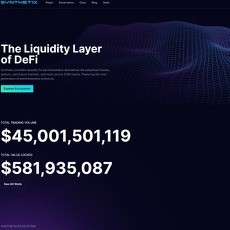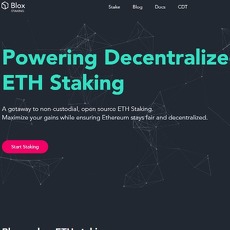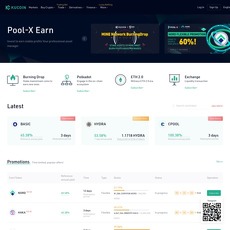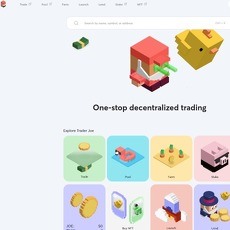Kraken Staking Review
Kraken Staking
www.kraken.com
Kraken Staking Review: Is It Really Worth Your Crypto? (Full Guide & FAQ)
Have you ever wondered whether staking your crypto assets on Kraken is genuinely worth the effort? Can it seriously boost your crypto gains, or could it potentially put your crypto holdings at risk?
You're not alone. Staking on Kraken has recently surged in popularity. Many crypto investors—both seasoned traders and newcomers—are turning to Kraken for staking crypto like Ethereum, Cosmos, and other digital assets. But, let's face it, knowing where to stake and understanding what it actually entails can get confusing pretty quickly!
What's Confusing or Frustrating About Staking Your Crypto on Kraken?
Crypto staking might sound great in theory—earning passive income simply by holding coins—but the reality? Most folks find staking complicated, intimidating, or just unclear. There's often a barrage of uneasy questions running on repeat through their minds:
- "Am I risking losing my money by staking these assets?"
- "Can I stake crypto from my state here in the U.S.?"
- "Exactly how much crypto rewards can I realistically earn staking Ethereum or Cosmos on Kraken right now?"
All these uncertainties can make a smart investment feel more like a risky gamble. Maybe you've had similar doubts or heard mixed stories online. It's perfectly natural to worry—investing your crypto assets shouldn't ever happen without clear answers to serious questions.
Don't Worry – I've Got You Covered
The good news is—it doesn't have to be confusing or stressful. In this easy-to-follow guide, I'll break down everything you really need to know, cutting out all the complicated jargon and crypto industry noise.
You’ll learn clearly and simply how staking works on Kraken, exactly what the benefits and pitfalls of staking are, and realistically understand whether or not Kraken’s crypto staking is worth it for you—based on your own situation and goals.
We'll tackle the tough questions openly. Risks, rewards, security, and limitations—all clearly explained, so you'll know exactly where you stand if you choose Kraken’s staking service.
Wondering about how staking actually works and why Kraken offers this feature? Keep reading—I'll cover that next in detail.
What Exactly Is Kraken Crypto Staking and How Does It Work?
If you're anything like me, you've probably seen Kraken promoting its staking features a lot lately, but wondered—what exactly is that? Is staking just another buzzword in crypto, or something genuinely valuable? Let me simplify this for you.
Imagine earning passive income just for holding certain cryptocurrencies. Kraken staking basically means you're locking cryptocurrencies on their exchange, contributing to a blockchain network's operation, security, and stability. In exchange, you're rewarded regularly with additional crypto—pretty much like earning interest at a crypto savings bank.
Here's how simple the process works:
- You hold eligible cryptocurrencies in your Kraken account.
- You opt into staking through Kraken’s user-friendly interface, selecting the coins you want to stake.
- Kraken manages the "techy" stuff behind the scenes—no complex setup required on your part.
- You receive rewards regularly—typically weekly—straight into your Kraken wallet.
It really can feel like "set it and forget it" passive income—with no need for mining equipment or complicated setups.
"Compound interest is the eighth wonder of the world. He who understands it, earns it... he who doesn’t... pays it." - Albert Einstein
Just like Einstein thought compounding was magical, that's exactly the magic you're tapping into by staking. Those rewards—especially if reinvested—can quickly pile up.
Why Does Kraken Offer Crypto Staking?
You might ask yourself, "What's in it for Kraken?" Good question—and there's no secret agenda here.
Kraken is one of the oldest and most respected crypto exchanges, founded back in 2011. Reputation-wise, they have a solid track record of prioritizing security and transparency, unlike some less established platforms out there. Offering crypto staking helps Kraken keep existing users happy, attract new customers, and encourage you to actively engage and keep your crypto on their platform rather than competitors.
Kraken benefits from increased liquidity and steady user engagement. The better the service they offer, the more likely customers stick around. Plus, staking services generate modest fees for Kraken, meaning it's genuinely in their best interest to ensure the staking process is secure, lucrative, and reliable for you.
Flexible vs. Bonded Staking Options
When you check out staking on Kraken, you'll see two types of staking—Flexible and Bonded Staking. Wondering what's the difference?
Here's the simple breakdown:
- Flexible Staking:
- No lock-up period—your crypto stays liquid.
- You can unstake anytime and quickly trade or withdraw your assets.
- However, often you'll earn slightly lower annual percentage rates (APRs).
- Bonded Staking:
- Your tokens are locked in for a predetermined timeframe.
- You can't move or trade your bonded coins until the bonding period concludes.
- In exchange, you typically earn higher staking rewards than flexible staking.
It's a classic trade-off—freedom versus returns. Flexible staking is ideal if you value liquidity and ability to quickly access your crypto. On the other hand, if your crypto is sitting idle anyway and you're after bigger rewards, bonded staking could work nicely and compound faster.
So, wondering which coins exactly you could stake through Kraken, and what real return rates you might expect for your ETH, ATOM, or newer coins like DYM? You're about to find out next…ready?
Coins You Can Currently Stake on Kraken (Updated List)
One of the best things about Kraken's staking service is its continually updated choice of crypto assets. Whether you're an Ethereum enthusiast, an ATOM advocate, or exploring new hits like Dymension (DYM), Kraken keeps staking relevant and rewarding. Here’s a quick rundown of the main coins currently available:
- Ethereum (ETH) - Everyone's favorite smart-contract powerhouse.
- Cosmos (ATOM) - A scalable blockchain platform creating seamless blockchain interaction.
- Dymension (DYM) - A promising newcomer offering exciting staking opportunities.
- Cardano (ADA) - Often praised for its strong academic foundations and sustainable long-term growth.
- Polkadot (DOT) - Leading the innovation in multi-chain interoperability.
- Tezos (XTZ) - Popular among staking fans for its liquid proof-of-stake mechanism and simplicity.
- Solana (SOL) - Known as the "Ethereum killer," Solana offers lightning-fast, low-cost transactions.
- Algorand (ALGO) - Compelling for its instant transaction finality and intuitive staking.
- Kusama (KSM) - Polkadot’s experimental network providing thrilling staking rewards.
"Go for a business that any idiot can run—because sooner or later, any idiot probably is going to run it." – Peter Lynch
This classic investing wisdom applies to staking too. Pick straightforward, trustworthy crypto coins on reliable platforms like Kraken. After all, you don't want unnecessary complexity turning your passive income dream into an operational headache.
Reward Rates for Popular Coins Like ETH, ATOM, and DYM
You’re probably wondering, "What's my potential return?" Right now, Kraken offers competitive annual percentage returns (APRs) on popular cryptos, making it worthwhile to stake your idle assets. Here’s a practical snapshot:
- Ethereum (ETH) - Typically yields around 3% to 7% APR, varying with network demand and Ethereum upgrades.
- Cosmos (ATOM) - Enjoy attractive rewards averaging between 9% to 14% APR, driven by the strong activity within its vibrant ecosystem.
- Dymension (DYM) - As a newcomer, rewards are notably higher and can range significantly, often exceeding 15% APR initially.
While Ethereum’s rate might seem modest compared to more speculative coins, remember, ETH provides stability and widespread use—helping balance risk and reward in your staking portfolio.
Are These Rates Guaranteed or Variable?
Fair warning: staking returns aren't set in stone. Cryptocurrency markets move fast and furiously—and staking rewards are no exception. Often influenced by factors such as blockchain usage, validator demand, market volatility, and network inflation, these APRs can fluctuate regularly.
In other words, good returns today don’t guarantee the exact same tomorrow. Kraken updates these rates transparently, ensuring users can adjust their strategies appropriately to market conditions.
Feeling curious yet? Are you thinking about staking from the U.S.? Wondering if there are specific state restrictions? Don't worry—I’ll answer all those pressing eligibility questions clearly and simply next. So, is your state on the list? Let's find out!
Can US Users Stake Their Crypto on Kraken?
The excitement about staking crypto on Kraken is real—but if you're based in the U.S., it's critical to know exactly what you can or can't do. The good news first: Yes, American crypto holders can stake digital assets on Kraken, including popular coins like Ethereum (ETH), Cosmos (ATOM), and a growing list of others. However, like many crypto endeavors, the answer isn't as straightforward as a simple "yes" or "no."
Let's be clear: Kraken's staking services are available in the US, but your exact eligibility depends largely on the state where you reside. This is because of varying state-by-state regulatory frameworks in the crypto landscape.
States Eligible for Bonded Staking on Kraken
Bonded staking—where your crypto is locked up for a fixed term, often yielding higher returns—is where many crypto fans see the juiciest potential. But does your home state let you participate?
- Most states allow bonded staking, but Kraken explicitly notes certain exceptions due to regulatory hurdles.
- As of the current updates from Kraken's own official resource page, users residing in New York and Washington state typically encounter more restrictions because of stricter regulatory frameworks in those areas.
- Kraken is transparent about the complexities: they clearly warn that "due to state-level licensing considerations, availability may change, and we advise all customers to frequently check their eligibility."
"Cryptocurrency regulations across different U.S. states remain fragmented and can be confusing for investors. Always double-check the latest details to avoid surprises." — Recent commentary by Forbes Crypto experts.
This regulatory inconsistency can feel frustrating—even unfair, I get it. No one wants to feel frozen out of staking opportunities simply because they live in a particular state. But knowledge is power: make sure to regularly check Kraken’s support pages to stay fresh on eligibility updates.
So if you're based in one of these tricky states, is staking totally off the table for you? And even if you're eligible, how safe actually is your crypto when you stake with Kraken? Could you lose anything? Let's tackle exactly that in the next section—keep reading, my crypto-curious friend, because the answers might surprise you!
Is Kraken Staking Really Safe? (Potential Risks Clearly Explained)
We’ve arrived at one of the top concerns anyone (including me!) has when it comes to staking crypto: is staking your precious coins on Kraken actually safe? Let's break it down clearly and honestly, without glossing over potential trouble spots.
Even though Kraken is a trustworthy exchange with a solid reputation, staking cryptocurrencies isn't 100% risk-free. Understanding exactly what these risks look like can mean the difference between a satisfying crypto journey and waking up in crypto cold sweats!
But first, let's set the record straight with a quote from Warren Buffett—arguably one of the greatest investors ever:
"Risk comes from not knowing what you're doing." – Warren Buffett
Let's fix that right now by looking closely at the real risks associated with staking on Kraken.
Can You Actually Lose Money By Staking on Kraken?
This is one of the most common questions I hear from beginners—and even seasoned crypto veterans. Yes, it’s technically possible to lose money when staking cryptocurrencies, though the scenarios causing outright losses on Kraken staking are quite limited.
The main danger comes in two forms:
- Volatility Risk: Your staking rewards might look amazing on paper, but crypto prices can change quickly. Let's say you've started staking Ethereum (ETH) when the price was at $1,500, and now it's fallen to $1,100. Even generous staking returns might not completely offset that price drop, leading to a net loss if you sell early.
- Protocol Risks ("Slashing"): Many people don't know this, but certain coins have rules built into their staking protocols that can punish wallet validators (stakers) for bad behavior. This punishment is called "slashing".
But how real is this slashing scenario? Let's explore that next!
What Is Slashing, and Could Your Crypto Become Affected?
Slashing sounds scary (and it can be!) but it shouldn't keep you awake at night. Simply put, slashing occurs when cryptocurrency protocols penalize validators who make mistakes or attempt fraudulent activities on the network by partially reducing (or "slashing") their staked coins.
Thankfully, if you're staking your crypto via Kraken, the stakes (no pun intended!) of slashing are significantly lower. Kraken uses safe staking methods with highly reputable validators. For instance, Kraken's staking services prioritize established and secure partners to drastically minimize slashing risks.
Here's a quick summary of how Kraken prevents slashing—it's pretty comforting:
- Professional Validator Management: They utilize professional-grade validators who deeply understand blockchain governance to avoid errors or downtime.
- Diversified approaches: Kraken doesn’t put all your coins with just one party, lowering the possible risk for major losses.
- Proactive Monitoring: Kraken actively monitors validator performance, quickly withdrawing funds from unreliable validators before slashing occurs.
Historically speaking, slashing accidents are rare—especially on Kraken. Still, crypto isn't known for guarantees. So better safe than sorry, right?
There's more to discuss when it comes to making decisions about Kraken staking—you haven't heard the complete story yet. Wondering what the exact pros and cons are in greater detail? Are there hidden pros that make Kraken's staking service perfect for certain investors, or secret cons that might ruin the party for others? I'll explain all this clearly and honestly in the next section—stick around so you can ensure you've got the full picture!
Pros and Cons of Using Kraken’s Staking Service
"Every choice comes with a price. Know the price first, then decide to pay or walk away." – Anonymous
Thinking about using Kraken for crypto staking? Let's get real about it. Just like choosing a restaurant, you want to know not just what's delicious on the menu—but also what could potentially ruin your evening. Here, I'll share with you straight up the good and bad sides of Kraken’s staking service, so you don't need to worry about nasty surprises later.
Advantages You Get with Kraken Staking
Right off the bat, here's why lots of crypto holders love Kraken staking:
- Super Easy to Use: Whether you're a beginner or seasoned pro, Kraken offers a straightforward, user-friendly interface that makes staking crypto surprisingly simple. Just a few clicks, and you're already earning passive income.
- A Trusted Reputation: Unlike fly-by-night crypto providers, Kraken has been around since 2011 with a solid track-record. It's one of the oldest, famously secure crypto exchanges around. Forbes called Kraken "one of the safest exchanges," and that's not lost on savvy investors.
- Competitive Staking Rates: Kraken generally offers attractive APR percentage returns for popular staked assets like Ethereum (ETH), Cosmos (ATOM), and more, helping users get more profitable results over time.
- Flexible and Bonded Options: Kraken doesn't limit you to just a single staking approach. You have the flexibility of choosing between bonded staking (higher rewards but longer lock-up times), or flexible staking (you trade off some reward but gain more liquidity), empowering you to choose what suits your financial goals best.
The Downsides You Should Be Aware Of
No platform is perfect—remember, there's always another side of the crypto coin:
- 50% Asset Limit on Flexible Staking: Kraken places a 50% limit on your holdings for flexible staking—meaning you can't stake all at once for certain coins if you prefer the flexible option. This could limit how effectively you deploy your assets if flexibility is important to you.
- Crypto Market Volatility: Let's keep it real—crypto prices change rapidly. Sure, staking gives rewards, but you could end up with lower market value over your staking period if coin prices fall steeply. Always factor this risk before committing your crypto for longer periods.
- Limited Selection of Available Coins: While Kraken offers popular staking assets like Ethereum and Cosmos, its overall staking selection is somewhat limited compared to some other platforms. If you're looking to stake a rarer or niche cryptocurrency, Kraken may disappoint you on variety.
Here's the truth: Kraken definitely has some great points that can simplify staking, but it's not without its inconveniences. After all, choosing where to stake your crypto is about matching your unique financial goals and personal preferences.
But hold on—aren't there some burning staking questions you've always wanted answered? Like whether your crypto could simply ‘vanish’ or what the real risks of slashing are? The next section has all the juicy details you've been dying to know.
Frequently Asked Questions About Kraken Staking (Your Crypto Staking FAQ, Answered Clearly!)
If you're considering staking your crypto with Kraken, chances are you've got some burning questions. I'm here to help clear those doubts to make your staking journey super easy. Here’s what people often ask me about staking on Kraken:
Which Coins Can Be Staked on Kraken?
Right now, Kraken offers staking for a range of popular cryptos, including:
- Ethereum (ETH): A solid favorite, known for its security and reliable rewards.
- Cosmos (ATOM): Famous for decent APRs, often around 12-15%, ideal for growing your stash steadily.
- Dymension (DYM): Emerging popularity due to Kraken recently adding it and offering attractive staking returns.
- Tezos (XTZ), Cardano (ADA), Polkadot (DOT), Solana (SOL), and numerous others are also available for staking with competitive incentives.
Kraken frequently updates and adds new assets, so it's a good idea to keep an eye on their official announcements for fresh staking opportunities.
Can You Stake Crypto on Kraken in The US?
"Good news travels fast."
Yes, US users can definitely stake crypto on Kraken!
However, due to various state regulations, bonded staking isn't yet allowed everywhere. States like New York and Washington are unfortunately excluded from Kraken staking at the moment. Always make sure to double-check Kraken’s own eligibility list to see if your state is permitted to begin your crypto-staking journey smoothly.
Can I Lose My Crypto When Staking on Kraken?
This is one question that's close to everyone's heart, and let me be clear: Your crypto doesn't simply vanish into thin air when you stake it. Kraken is extremely reputable and has robust safety measures. But—and it's a pretty significant "but"—there are still some genuine risks, mainly from crypto volatility and something known as "slashing."
What Are the Main Risks with Kraken Staking?
The most realistic staking risks to watch out for are:
- Crypto Market Volatility: Prices fluctuate, and so could your coin’s dollar value. If Ethereum’s market price falls drastically while your ETH is staking, your total portfolio value declines—even if the number of coins stays the same.
- Slashing: This is important—a penalty applied by blockchains if validators misbehave, potentially resulting in losing some staked crypto. Kraken takes extensive precautions, vetting validators strictly to minimize this risk, but it's still something you should be aware of.
Statistics from the blockchain analytics firm Messari show that slashing is extremely infrequent, especially through trusted, regulated staking providers like Kraken. Yet awareness of these risks ensures your staking strategy remains smart rather than emotional.
"Risk comes from not knowing what you’re doing." — Warren Buffett
Now you've got a clear idea about the highlights and risks of Kraken staking, but you might still wonder—
How can you make your staking even more profitable and secure? Keep on reading because I'm about to show you some powerful resources and exclusive insights that'll make your staking decisions smoother, smarter, and stress-free.
Additional Helpful Resources and Tools to Support Your Staking Journey
By now, you've got a solid understanding of what's involved with staking your crypto on Kraken, but knowledge is power—and having the right resources can turn you from curious into a crypto staking pro.
Here, I'm sharing some extra tools and helpful materials that can enhance your staking journey and help you make decisions confidently:
Kraken's Official Staking Guide and Documentation
There's no better place to start enhancing your understanding than Kraken itself. Check out their official staking documentation. It's a detailed yet easy-to-follow guide that covers:
- Step-by-step instructions on how to stake your crypto on Kraken
- Current Coin reward rates for ETH, ATOM, DYM, and others
- Important FAQs and specific examples of staking scenarios
Kraken's Security Center (Safety First!)
If you're anything like me, safety is your number one priority when it comes to crypto investments. Kraken's Security Center has tons of useful tips to help keep your digital assets safe while staking. Topics include how Kraken stores your funds, best practices for account safety, device security, and other essential topics to keep your peace of mind intact.
Coin Staking Calculators and Profit Estimation Tools
Who doesn't love running the numbers before putting assets at stake (literally)? Some great third-party staking calculators exist that will help you quickly estimate your ROI (return on investment). Here are a couple of my favorites:
- Staking Rewards Calculator: Offers accurate estimates based on real-time market rates and current rewards. Available at stakingrewards.com.
- Kraken's own rewards calculator platforms: Built directly into their website, providing straightforward, clear breakdowns of your estimated returns.
Community Discussions and Forums (The Power of the Crypto Crowd)
Sometimes the best insights come straight from the crypto community itself. My advice? Join Kraken-dedicated subreddits, forums like Bitcointalk, or Discord servers. You'll find first-hand user experiences, advice, and up-to-date conversations about staking performance, best practices, and potential pitfalls you might not find elsewhere.
- The official "Kraken subreddit" has thousands of active traders and stakers, offering genuine user feedback, tips, and helpful advice about staking.
- Kraken's official Discord community—where you can actively ask Kraken support staff questions directly and get quick responses.
Crypto News and Insights – Keep Up To Date
The crypto market moves quick, right? Staying updated about the latest coin developments, rates, and general crypto news will help you adjust and react to staking opportunities as they surface. Bookmark specialist crypto news platforms (like Cryptolinks!) for reliable, constantly updated crypto news and reviews.
"Investing in knowledge pays the best interest" – Benjamin Franklin
All these tools together will elevate your crypto staking experience, helping you to maximize returns, manage risks effectively, and feel secure in your journey. But wait—are Kraken's staking features really right for your investing style? Curious to hear my honest thoughts and alternative recommendations?
Stay with me; the next section will answer exactly that!
So, Should You Stake on Kraken? (Here's My Honest Take)
After exploring all angles of staking crypto on Kraken, here’s my genuine perspective: Kraken is great—but it's not a one-size-fits-all deal.
Kraken staking makes plenty of sense if you're after simplicity and reliability. Kraken has a strong reputation built on trust, security, and transparency—it's stood the test of time through countless crypto ups and downs.
But it's important you go into it with eyes wide open. Remember those variable APRs we talked about earlier? While the rewards can look appealing (for instance, ATOM regularly hovers around an appealing 18% per year), crypto markets change. Your actual returns might fluctuate quite a bit—so don't bet everything on consistent earnings.
On the safety front, Kraken has a solid track record. Yes, slashing events—those occasional penalties on the blockchain we discussed—can still technically happen, possibly affecting your crypto holdings. Thankfully, Kraken is pretty meticulous about picking their underlying validators, so the odds of severe penalties are extremely low.
Here's my simple rule of thumb for Kraken staking:
- If you're a crypto beginner or prefer not worrying about finding secure validators, managing wallets, and technical details—Kraken staking could be the simple, stress-free option you need.
- If you prioritize trust, reputation, ease-of-use, and fairly strong security features over chasing the absolute highest APRs out there, then Kraken’s staking platform fits your needs perfectly.
But if you're more experienced in crypto, or perhaps you're hunting for the highest returns you can possibly find, keep reading—I’ll briefly mention some alternatives worth checking out.
When Does Kraken Staking Make Sense for You?
So, let’s keep this super practical:
- You're new to crypto staking: Kraken helps you avoid making rookie mistakes—like choosing an untrustworthy validator or messing up transactions. It’s simple and secure enough for beginners to easily grasp and find success.
- You want something more straightforward than setting up a wallet, dealing with validator selection, or navigating technical exchanges. Kraken gives you a clear interface, built-in staking, and reliable returns—all with fewer headaches.
- Safety and peace-of-mind matter most: Kraken’s history and solid reputation offers confidence. While staking is not entirely without risk, Kraken dramatically reduces many of the scary pitfalls that your average crypto holder worries about.
If those scenarios resonate with you—even just a bit—I strongly recommend giving Kraken staking serious consideration.
Maybe You Should Consider Alternatives to Kraken (It's Always Good to Know Options, Right?)
But what if Kraken isn't the perfect fit?
I'm a big believer in knowing your alternatives, especially with limited coin availability and flexible staking limits that Kraken imposes.
Here are a few other staking options worth exploring, depending on your crypto goals:
- Coinbase: A very user-friendly alternative that appeals strongly to beginners. Sometimes they offer slightly higher APR on select assets, and beginners usually appreciate their intuitive interface.
- Binance: If you want wider variety and potentially higher staking rates, Binance tends to offer more staking coins and flexible options. But remember, Binance isn't universally available in all U.S. states, nor globally, without restrictions.
- Self-managed staking wallets (Atomic Wallet, Exodus): If you’re comfortable with software wallets, choosing your validator, and managing your own keys, then some DIY-wallet solutions might offer higher APRs or more flexibility—though with extra responsibility comes extra risk.
Take some time to explore these alternatives. Remember, the perfect choice for one crypto enthusiast won't always suit another.
Bottom Line: Is Kraken Crypto Staking Worth It?
So let's wrap up clearly and straightforwardly:
Staking crypto on Kraken IS worth it for most beginners, casual investors, or anyone valuing simplicity, trust, and security above chasing the highest imaginable returns.
You’ll likely be happy and comfortable knowing that your coins are well-attended-to by Kraken—and that security and convenience are robust.
But if your priorities lean toward getting the absolute highest APR rates or staking obscure altcoins, then you might find other platforms or solutions fitting your needs much better.
Ultimately, remember cryptocurrency investing is always personal. Do your own research and choose the staking solution that feels right for your risk comfort level, technical expertise, and investment goals.
Whichever route you take, the crypto staking world is fascinating and full of potential. So get out there, pick your path, and let your crypto start working for you!


